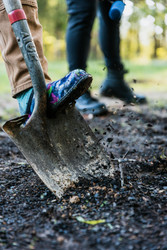Insulated Vs Non-Insulated Shovels
30th Aug 2024
Insulated Vs Non-Insulated Shovels
When you want to do the job correctly, you need the right tools. In this post, we'll dig down (pun intended) into choosing the best shovels for your on-site needs. So lets look more closely at the differences between insulated and non-insulated shovels.
Non-insulated vs insulated tools
Insulated tools aren't just ordinary tools with some extra rubber insulation. They're the best choice for keeping you safe when working with electricity. However, non-insulated tools can be an affordable and durable choice for some basic tasks around a construction site.
Non-insulated shovels for durability and versatility
A basic non-insulated shovel is a great choice for most construction tasks. It's durable, versatile, and budget-friendly, making it your go-to when digging and moving materials on-site. As a result, non-insulated shovels are popular with construction professionals because they handle heavy-duty tasks with ease.
But here's the catch with non-insulating shovels. Most are made from steel to withstand the wear and tear of being used on a busy construction site. But it's a highly conductive material that has no electrical insulation. If you're likely to come into contact with live cables, using a non-insulated shovel could lead to serious injury or death.
Insulated shovels for superior protection
Insulated shovels are not just lightweight. They're made with safety in mind. Let's say you're working in an environment with live cables. An insulated shovel will prevent electricity from passing through the handle and into your body, keeping you safe from electric shock. As a result, you can work safely and efficiently.
Unlike a basic metal shovel, an insulated shovel has a solid fibreglass core covered in tough and flexible polypropylene. As a result, an insulated shovel provides excellent insulation properties, protecting you against abrasion and high voltage. In addition, there's a rubber hand stop so you don't accidentally touch the blade.
The right shovel for the job
Choosing the right shovel comes down to the job itself. A non-insulated shovel makes short work of most construction digging tasks.
But when safety is paramount, look for insulated shovels that meet BS8020:2011. These tools are subject to a flash detection test to 10,000 volts, to meet the highest safety standards. So you know you can depend on your tools to protect you in a hazardous work environment.
p { line-height: 115%; text-align: left; orphans: 2; widows: 2; margin-bottom: 0.25cm; direction: ltr; background: transparent }

